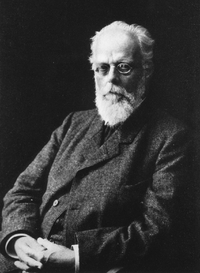More languages
More actions
August Weismann | |
|---|---|
 | |
| Born | 17 January 1834 Frankfurt am Main, Hesse |
| Died | 5 November 1914 Freiburg, Germany |
| Nationality | German |
| Field of study | Genetics Neo-Darwinism |
August Weismann (17 January 1834 – 5 November 1914) was a German geneticist. He proposed that a germ plasm within the gametes (reproductive cells) was the only factor determining an organism's traits. He claimed that the somatic cells that made up the rest of the body had no influence on the germ plasm and that nothing that happened to these cells could be inherited. He believed that environmental factors such as radiation and certain chemicals could change the germ plasm but only through random mutations. Unlike Darwin, Weismann and other neo-Darwinists mocked the theories of Lamarck.[1]
References[edit | edit source]
- ↑ "Lysenko’s great contribution to the understanding of heredity" (2010). Lalkar. Archived from the original on 2023-04-21.
